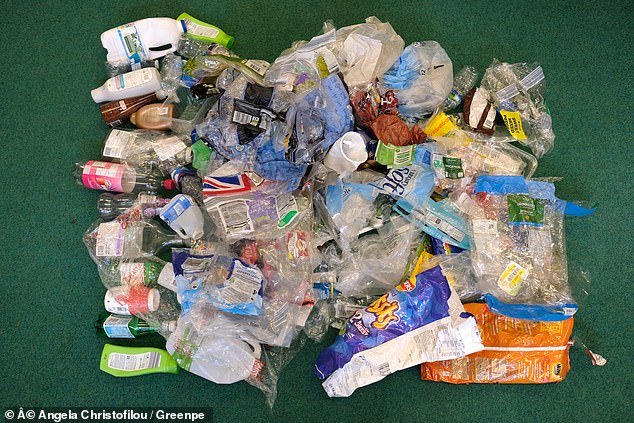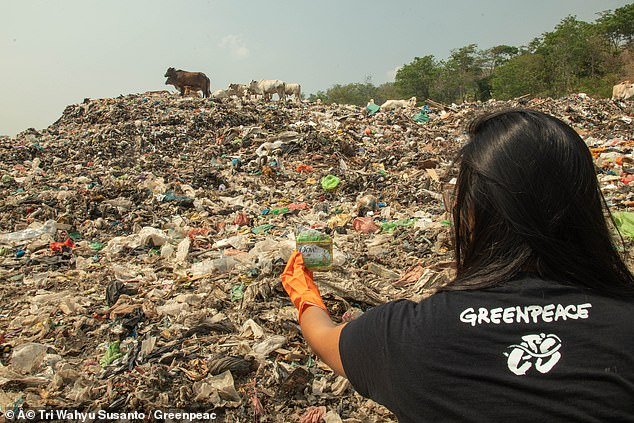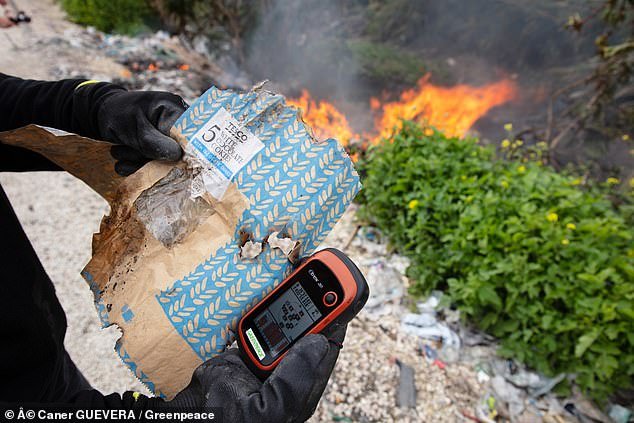The shocking scale of the UK’s plastic crisis: 1.7 BILLION pieces of waste are thrown away by UK households every week, research shows
A shocking report has exposed Britain’s plastic crisis, with households throwing away a whopping 1.7 billion pieces of waste every week.
The Big Plastic Count, a study organized by Greenpeace, asked 225,000 participants to count how much waste they threw away in seven days.
The research shows that UK households throw away 60 pieces of plastic packaging every week, equating to 90 billion pieces of waste per year across the country.
Unfortunately, only 17 percent of that waste is recycled domestically, while 58 percent of the UK’s waste is incinerated.
Laura Burley, project leader of the Big Plastic Count at Greenpeace, said: ‘If I started counting every piece of plastic packaging that Britain throws away in a year, it would take me until 2077 to count every piece.’
A shocking report reveals that British households throw away 1.7 billion pieces of plastic waste every year, much of which is incinerated or exported abroad (pictured)
Since 2022, when Greenpeace conducted the first plastic count, there has been growing public pressure to reduce the amount of plastic waste generated.
A recent Greenpeace survey found that 74 percent of Britons surveyed were in favor of reducing plastic use in Britain.
However, the amount of plastic produced this year is virtually the same as in 2022, indicating that very little real progress has been made.
Ms Burnley said: “Our national research shows that tidal waves of plastic packaging are leaving homes every week.
“The problem is enormous, and the challenge of solving it can seem overwhelming.”
Snack packaging was the most commonly discarded waste, with participants counting 699,932 pieces in just seven days.
This was closely followed by plastic fruit and vegetable packaging, of which 697,085 pieces were counted.
In total, 81 percent of all waste thrown away by British households was food and drink packaging.
The research also shows that only a very small proportion of UK plastic waste is recycled in the UK.

Households counted the waste they used each week and found they threw away an average of 60 pieces of waste (pictured)
The majority of the UK’s waste is now incinerated, with incineration rates increasing by 12 percentage points from just 46 percent in 2022.
However, this is not a clean solution to the problem, as burning plastic produces more carbon dioxide per tonne than coal.
Dr. Cressida Bowyer, a plastics expert from the University of Portsmouth, said: ‘These results clearly show that the plastic waste problem is not getting better, and recycling is not going to solve it.
‘New thinking about packaging choices, supported by legislation, is urgently needed.’
Of the remaining waste, 11 percent ends up in landfills in Britain, while 14 percent is exported to other countries where it ends up in major landfills.

Waste from British supermarkets has been found in landfills as far away as Indonesia (pictured), as only 17 percent is recycled domestically

58 percent of all waste in Britain is now incinerated. Burning waste produces more CO2 per tonne than burning coal
Greenpeace’s research found that plastic waste from British supermarkets is being burned in Turkey and in landfills in Indonesia.
Rudy Schulkind, political campaigner at Greenpeace UK, said: ‘The worst affected are marginalized communities and people of colour, who are more likely to live near incineration sites or be harmed by the waste we dump in countries in South.’
This study comes ahead of the meeting of the Intergovernmental Negotiating Committee for a Global Plastics Treaty later this month.
175 countries by 2022 agreed to create legally binding plastics legislation by the end of 2024.
Under this UN initiative, countries will have a legal obligation to impose restrictions on the production and use of plastic.
Greenpeace is calling on the UK government to support the introduction of legally binding targets and calling for a 75 percent reduction in plastic production by 2024.
Mr Schulkind says: ‘This year we have a unique opportunity to finally achieve a global, legally binding goal to radically reduce plastic production.’
